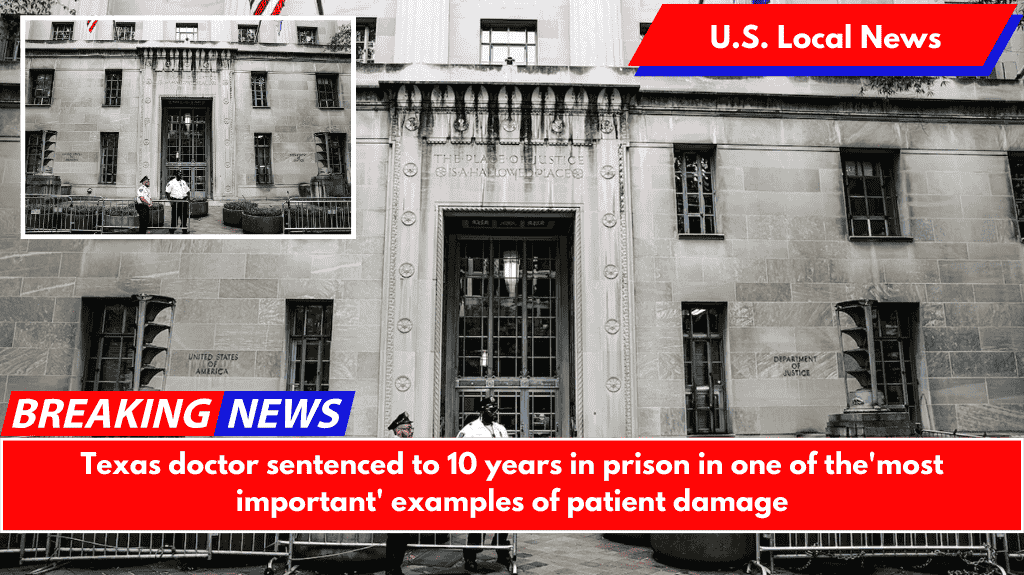A Texas doctor was sentenced to 10 years in prison on Wednesday for healthcare fraud after prosecutors said he ran a nearly two-decade scheme that involved falsely diagnosing thousands of patients with degenerative diseases and profiting handsomely from their treatments.
Jorge Zamora-Quezada, a rheumatologist who was licensed to practice medicine in Texas, Arizona, and Massachusetts before being stripped of his licenses in each state, earned hundreds of millions of dollars for the misdiagnoses and treatments he prescribed during his roughly 20-year career.
The treatments included punishing rounds of chemotherapy, intravenous infusions, and a slew of other tests, monthly visits, and routine procedures associated with the treatment of rheumatoid arthritis, a chronic, autoimmune condition that has no cure.
The sentencing, as well as his previous court appearances, were sometimes a study in contrasts. Prosecutors detailed his extravagant lifestyle, which included a private jet, 13 properties in the United States, including Aspen and various towns in Mexico, and a Maserati, all while the health of the patients he defrauded deteriorated.
Prosecutors accused him of exploiting vulnerable individuals in Texas, including teenagers, the elderly, and the disabled, in order to carry out the scheme. Some of them testified at Wednesday’s hearing about the long-term side effects of the doctor’s actions, such as receiving unnecessary chemotherapy or IV infusions.
In a sit-down interview with Fox News Digital on Wednesday, Matthew Galeotti, head of the Justice Department Criminal Division, described it as “one of the most egregious” cases of its kind brought by the department in this space.
That’s due to “all of the various kinds of misconduct rolled into one,” he told me, “and because it was pervasive – the scheme lasted more than 18 years.”
“By the time you’re towards the end of the scheme, he knows the consequences some of these things have had on the victims, and he’s going forward anyways,” he commented regarding the physician.
This case has been prosecuted by the Justice Department’s Criminal Division for several years. Unlike other departments, it is one of the few where both career and political staff are largely in agreement, with goals and cases that go beyond partisan politics and seek to hold criminals accountable, such as the Texas doctor.
Galeotti believes the case exemplifies the Trump administration’s efforts to vindicate victims and combat wasteful government spending.
“Even in cases where you don’t see this level of misconduct, where you’re not prescribing someone chemotherapy medicine that doesn’t need it, which obviously sort of stands out on its own, we still have a problem because you were wasting government funds that should be going to actually benefiting patients,” Galeotti told the audience.
A separate Justice Department official told Fox News Digital that Zamora-Quezada’s case was one of the “most significant” examples of patient harm he had seen in at least a decade.
“There was testimony about truly debilitating side effects from the medications, things like strokes, necrosis of the jawbone, really the jawbone melting away, hair loss, liver damage,” according to an official.
According to the Justice Department, the doctor’s actions were particularly egregious because they sought to prey on lower-income communities in Texas, specifically teenagers, the elderly, and the disabled.
The doctor also worked in areas with limited access to medical care and fewer native English speakers than other parts of the state.
“Of course, it’s always the most twisted when you’re benefiting from someone else’s misfortune – misfortune you caused – and misfortune you used for your own personal enrichment,” Galeotti told the audience.
“They’re the hallmarks of the worst kind of conduct that you see,” Galeotti told the audience.
Zamora-Quezada was found guilty by a jury in 2020 of seven counts of healthcare fraud, one count of conspiracy to commit healthcare fraud, and one count of obstruction of justice. According to public court filings, his attorneys argued that the fraud was not as “pervasive” as the government claimed.
Prosecutors claim Zamora-Quezada purchased condominium properties in vacation destinations such as Aspen, San Diego, and Puerto Vallarta, Mexico. They claimed he commuted to his various doctors’ offices in Texas in a Maserati and a private jet, both bearing his initials, “ZQ.” His assets were forfeited after being charged, according to prosecutors.
Meanwhile, they claimed that, despite living in luxury, Zamora-Quezada diagnosed rheumatoid arthritis in 72.9% of the nearly 100,000 Medicare patients he treated. Prosecutors compared that data to seven other Texas rheumatologists, who diagnosed 13% of their patients with the same condition.
Prosecutors requested $100 million in restitution, but the judge ordered him to pay $28 million.











